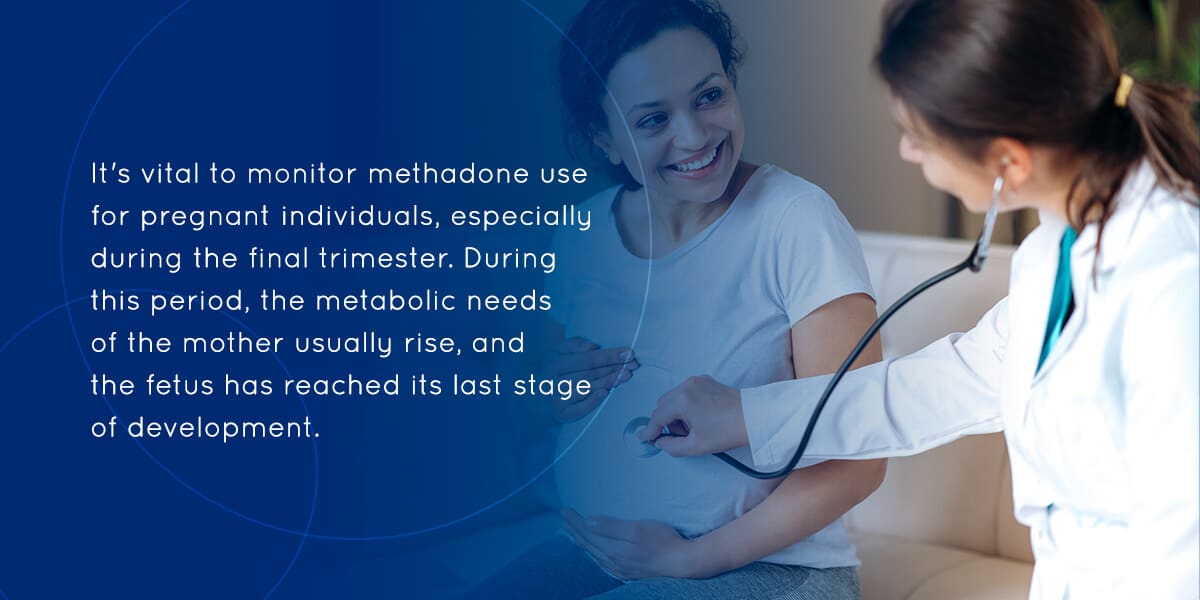Methadone is an opioid medication that helps treat a patient’s addiction to opioids without withdrawal symptoms. It’s usually recommended for people who want to recover from heroin addiction. Still, it’s effective for helping people overcome any opioid addiction. Pregnant women who use heroin during pregnancy can suffer premature births or miscarriages. To help them, methadone is approved for use during pregnancy in a medication-assisted treatment (MAT) program.
However, using MAT medications such as methadone can still have serious health consequences for newborns if not medically supervised. All drugs taken by a pregnant woman can flow through the placenta and reach the fetus in the womb, so the dose must be closely monitored and managed. Let’s look further at the effects of taking methadone while pregnant.
Is It Safe to Get Pregnant While on Methadone?
Taking methadone while pregnant heightens the risk of neonatal abstinence syndrome (NAS). NAS may occur when a baby is born to any mother utilizing an MAT program. Still, if a patient takes methadone or Suboxone® on her own, the baby may be born addicted to the medication, particularly if the patient is taking more than the safe, recommended amount.
While medication-assisted treatment in a medically supervised program may lead to minor NAS symptoms for a newborn, it is far less risky than being born with heroin withdrawal symptoms. NAS can be treated, so it’s unlikely to lead to neonatal defects and abnormal development. If a pregnant woman is addicted to opioids, it’s better to begin a safe treatment plan immediately to reduce the risk of birth complications and disorders.

Are There Risks Involved in Taking Methadone While Pregnant?
There are side effects of taking methadone for the fetus. If a high amount is taken, the baby may become drug dependent, leading to withdrawal symptoms shortly after birth. Likewise, if the mother takes an amount less than recommended, it can also cause withdrawal symptoms. These symptoms could be harmful to the mother and the fetus. Thus, methadone or other treatment medications should be taken in a medically-supervised program.
It’s vital to monitor methadone use for pregnant individuals, especially during the final trimester. During this period, the metabolic needs of the mother usually rise, and the fetus has reached its last stage of development. Doses will need to be carefully adjusted for the health of the baby and the well-being of the mother.
What Happens to Babies Born During Opioid Addiction?
A baby born to a person with opioid addiction can display withdrawal symptoms in the first two days. Babies who are exposed to methadone during pregnancy could experience:
- Respiratory symptoms such as stuffy nose, fast breathing and repeated sneezing and yawning.
- Nervous system issues, including decreased sleep, being jittery and irritable and becoming startled due to sound or touch.
- Digestive system problems such as slow weight gain, loss of appetite, poor feeding, dehydration and vomiting.
The baby may also experience seizures if the expectant mother frequently takes an abnormally high amount of opioids.
Are There Alternatives to Methadone During Pregnancy?
Some research suggests that Suboxone® is a safe alternative to methadone during pregnancy. In contrast, more recent research indicates that further medical research is needed to determine whether you can take Suboxone® if you’re pregnant.
Suboxone® contains buprenorphine and naloxone. Buprenorphine is an opioid that blocks the effects of other opioids and doesn’t produce a euphoric effect. As a result, Suboxone®:
- Is far less addictive than other opioids
- Reduces your cravings for opioids
- Blocks any effect that opioids may have while you’re taking buprenorphine
The Centers for Disease Control and Prevention (CDC) states that buprenorphine is safe during pregnancy, but naloxone may not be. Buprenorphine carries the same safety profile as methadone for treating opioid use disorder (OUD) during pregnancy. In contrast, naloxone lacks well-controlled studies in pregnant individuals. For this reason, naloxone isn’t recommended to treat OUD during pregnancy.
Other alternatives to methadone treatment include:
- Behavioral therapy
- Peer support groups
- Lifestyle changes
- Other forms of counseling
That said, these alternatives usually complement rather than substitute MAT.
Can Methadone or Suboxone® Cause Birth Defects?
Between 2-3% of all babies are born with birth defects. Most studies find that methadone and buprenorphine don’t increase that background risk. The risk of taking Suboxone® during pregnancy appears similar. Still, research isn’t established enough to confirm whether Suboxone® increases the risk of congenital disabilities.
Other birth problems may occur if you take more methadone than your doctor recommends during pregnancy. These birth problems may include low birth weight or preterm delivery.
Methadone Maintenance During Pregnancy
OUD treatments like methadone or buprenorphine work best when paired with complementary therapies. Complementary treatments include substance use counseling and other healthy habits. As you use methadone or buprenorphine to treat addiction, here are some ways to make the most of your treatment:
Counseling Options During Pregnancy
Substance use counseling includes group, family and individual options. Each option offers unique benefits that help individuals recover from the effects of opioid addiction. Some benefits of individual counseling include:
- Helping you change your thoughts and behaviors toward opioids and other substances by attending to the emotions you feel with them
- Teaching helpful strategies for healing and rebuilding relationships damaged from your experience with addiction
- Finding effective coping mechanisms for handling stressful and difficult life circumstances without resorting to harmful habits
- Learning about the science of addiction and applying that knowledge to avoid relapsing
- Developing a relationship with your counselor, which establishes a safe environment to discuss previous traumas, family issues and other troubles you’re facing
- Applying what you’ve learned in counseling to contribute to the community and workforce
Group counseling offers similar benefits, but the unique setting allows for different outcomes. Some unique benefits of group counseling include:
- Providing the opportunity to share your experience with and learn from others in recovery
- Feeling less shame and guilt when you hear about another person’s similar experiences with addiction
- Developing accountability among other like-minded individuals as you work toward recovery
- Establishing a strong support network of others who experience similar challenges — their support helps you persevere in sobriety
Health Tips for Mothers Battling Addiction During Pregnancy
Here are some health tips for mothers battling addiction during pregnancy:
- Learn about the science of addiction.
- Stay informed on the effects substance use can have on yourself and your baby.
- Build, nourish and lean on strong support groups to help you persevere in sobriety.
- Exercise regularly and eat a healthy diet.
- Try counseling or cognitive-behavioral therapy (CBT).
- Remove substances from your home.
- Find healthy coping mechanisms and turn them into habits.
- Forgive yourself when relapses happen, and try again.
Treatment is available if you need extra help with battling addiction during pregnancy. BAART has various treatment centers across the United States in Arizona, California, Colorado, Louisiana, Nebraska, North Carolina, Utah, Vermont and Washington state.
We provide outpatient MAT care with methadone and buprenorphine for individuals struggling with addiction. We also provide substance use counseling to help you find success on your journey to recovery.
Contact Your Local BAART Program Center
For more information about using opioids during pregnancy, contact us or give us a call at 844.341.4040 for an appointment. We can help you and your loved ones overcome substance abuse disorder and live a normal, fulfilling life.




